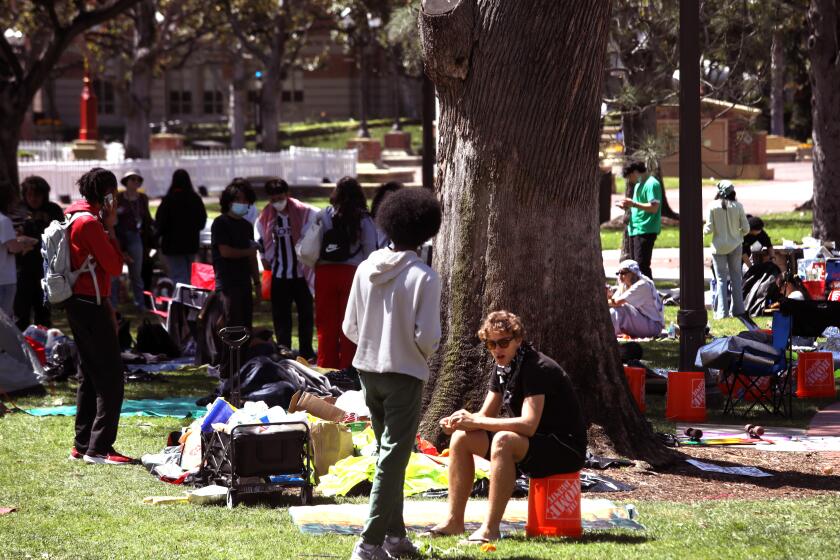School’s ice cream parlor dishes up life skills
Joseline Reyes had the scoop on the hottest day of the year so far at her school.
She had two scoops, in fact.
“I’ve got cookies ‘n cream. It’s my favorite,” the 15-year-old said as she relaxed in the Baskin-Robbins ice cream parlor that sits in the middle of a Glendale school’s grounds.
Joseline, of Van Nuys, attends summer school classes at Tobinworld, a 300-student campus for autistic and emotionally disturbed youngsters.
Besides being a popular place on a hot day, the Baskin-Robbins store is a centerpiece of the school’s curriculum.
Teachers use it to motivate students to learn and modify their behavior. The not-for-profit store also helps build business and social skills and prepares teenagers for the work world.
Open since 1995, the one-of-a-kind school store resembles a real Baskin-Robbins outlet, right down to its signage, furnishings and cheery pink paint scheme.
“The company made us change the shade of pink before we opened. Baskin-Robbins wanted it right,” said Judith Weber, founder and executive director of Tobinworld. “The president of Baskin-Robbins was here for the store’s grand opening.”
The school is named after Weber’s son, Tobin, now 43. She established the campus in 1977 after discovering there was no public school program available for him in the Los Angeles area.
These days, 23 local school systems, including the Los Angeles Unified School District, send special-needs students to the five-building campus on East Broadway. Federal and state funds pay about $30,000 a year per student to cover Tobinworld’s operating costs.
Classroom work for the school’s K-12 student body is based on what Weber describes as a reward system. Youngsters earn tokens for positive behavior and for completing assignments.
They use the tokens to pay for their ice cream. A menu board above the store’s freezer counter lists the prices: One scoop costs one token, three-scoop sundaes sell for three tokens, floats cost four and malts and shakes require five. Banana splits sell for six tokens.
The school’s 250 staff members can also buy ice cream cones and sundaes, but they have to pay cash.
Twenty-six teenagers work at the school’s Baskin-Robbins. They apply for the positions like real employees do and undergo a pre-employment interview. On the job, they wear official company uniforms. They are not paid for their work at the not-for-profit store.
“Four of our students have gone on to get jobs at actual Baskin-Robbins stores,” said Chris Lougheed, the school’s assistant principal. Others have used their campus store experience to land employment at fast-food outlets.
Student Ricky Daniels, 20, of San Fernando, said he can visualize continuing to work as an ice cream scooper after he graduates.
“This is definitely preparing us for the next step,” said Nirandon Boonyindee, 18, of Los Angeles, as he filled a large order to be delivered to a class of autistic youngsters in a nearby building.
Co-worker Michael Moreno, 15, of North Hollywood, agreed. “We’re learning how to deal with reality. We’re taking a big leap into the future by working here.”
Customer Leandre Holland, 18, of Compton, was finishing his cup of cookies ‘n cream. “My friends don’t believe me when I tell them my school has a Baskin-Robbins,” he said.
The ice cream is supplied to the school at a discount by Varuzh Tirityan, a Baskin-Robbins franchisee with a retail store in Burbank. He said his company is a believer.
“They do a lot of good things for kids there, so we wanted to support them,” Tirityan said. “Ice cream is a fun thing. And it’s helping them.”







